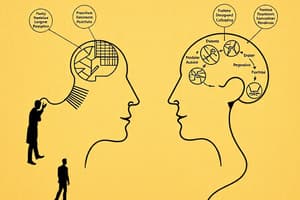Podcast
Questions and Answers
Who established the first formal psychology laboratory in 1879?
Who established the first formal psychology laboratory in 1879?
- Sigmund Freud
- John Locke
- René Descartes
- Wilhelm Wundt (correct)
Which ancient philosophers are mentioned as having laid the foundation for understanding human thought and emotions?
Which ancient philosophers are mentioned as having laid the foundation for understanding human thought and emotions?
- Galileo, Copernicus, Newton
- Seneca, Marcus Aurelius, Epicurus
- Plato, Aristotle, Confucius (correct)
- Socrates, Hippocrates, Pythagoras
Which period saw the birth of empiricism and laid the groundwork for scientifically oriented approaches to psychology?
Which period saw the birth of empiricism and laid the groundwork for scientifically oriented approaches to psychology?
- Enlightenment and Early Modern Period (correct)
- Psychodynamic Perspectives (Early 20th Century)
- Ancient Contributions
- Rise of Psychology as a Science (19th Century)
Which psychologist's work dominated the early decades of the 20th century with groundbreaking insights into the unconscious mind?
Which psychologist's work dominated the early decades of the 20th century with groundbreaking insights into the unconscious mind?
Who developed alternative perspectives to Freud's work, broadening the scope of psychodynamic theory?
Who developed alternative perspectives to Freud's work, broadening the scope of psychodynamic theory?
Which approach focused on observable behavior rather than internal mental processes as an alternative to Freudian psychoanalysis?
Which approach focused on observable behavior rather than internal mental processes as an alternative to Freudian psychoanalysis?
Which group of researchers spearheaded the cognitive revolution, focusing on mental processes involved in learning, problem-solving, and memory?
Which group of researchers spearheaded the cognitive revolution, focusing on mental processes involved in learning, problem-solving, and memory?
What has led to significant advancements in understanding the relationship between brain structure and function?
What has led to significant advancements in understanding the relationship between brain structure and function?
Which approach seeks to understand the neural basis of behavior and mental processes?
Which approach seeks to understand the neural basis of behavior and mental processes?
What did the theorists like Carl Jung, Alfred Adler, and Erik Erikson do to Freud's work?
What did the theorists like Carl Jung, Alfred Adler, and Erik Erikson do to Freud's work?
During which historical period did thinkers like Rene Descartes, John Locke, and David Hume begin to question the nature of consciousness and the human mind?
During which historical period did thinkers like Rene Descartes, John Locke, and David Hume begin to question the nature of consciousness and the human mind?
Which ancient Greek philosophers provided profound insights into human emotions, thought processes, and the nature of the soul?
Which ancient Greek philosophers provided profound insights into human emotions, thought processes, and the nature of the soul?
Which historical period saw a radical shift towards scientific study away from religious and philosophical interpretations of human behavior?
Which historical period saw a radical shift towards scientific study away from religious and philosophical interpretations of human behavior?
Who is credited with marking a pivotal turning point in the field of psychology during the 19th century with the establishment of the first formal psychology laboratory?
Who is credited with marking a pivotal turning point in the field of psychology during the 19th century with the establishment of the first formal psychology laboratory?
Which psychologist introduced the behaviorist movement in the early 20th century, focusing on observable behaviors and environmental factors?
Which psychologist introduced the behaviorist movement in the early 20th century, focusing on observable behaviors and environmental factors?
Who among the following figures contributed to the emergence of cognitive psychology after World War II, focusing on mental processes like perception and memory?
Who among the following figures contributed to the emergence of cognitive psychology after World War II, focusing on mental processes like perception and memory?
During what period did neuroscience, genetics, and interdisciplinary approaches begin to shed light on the workings of the human brain and behavior?
During what period did neuroscience, genetics, and interdisciplinary approaches begin to shed light on the workings of the human brain and behavior?
Who is often recognized as the 'father of experimental psychology' for establishing the first psychological research laboratory in 1879?
Who is often recognized as the 'father of experimental psychology' for establishing the first psychological research laboratory in 1879?
Which movement focused on understanding human behavior through classical and operant conditioning principles during the early 20th century?
Which movement focused on understanding human behavior through classical and operant conditioning principles during the early 20th century?
What distinguishes cognitive psychology from behaviorism?
What distinguishes cognitive psychology from behaviorism?
Flashcards are hidden until you start studying
Study Notes
Exploring the History of Psychology
Psychology, a multifaceted discipline that delves into the human mind and behavior, has a rich and captivating history spanning centuries. Let's trace the evolution of this field through some of its most influential eras and groundbreaking thinkers.
Ancient Contributions
Early philosophers such as Plato, Aristotle, and Confucius laid the foundation for understanding human thought and emotions. Their seminal works on topics like the soul, perception, and morality paved the way for future psychological inquiries.
Enlightenment and Early Modern Period (17th-19th Century)
During the Enlightenment, philosophers like John Locke, René Descartes, and David Hume advanced the field with theories about the mind's role in perception, behavior, and consciousness. It was a period that also saw the birth of empiricism, laying the groundwork for scientifically oriented approaches to psychology.
The Rise of Psychology as a Science (19th Century)
In the 19th century, Wilhelm Wundt established the first formal psychology laboratory in 1879, and his work led to the development of experimental psychology. Other pioneers like Hermann Ebbinghaus and Gustav Fechner made significant contributions to cognitive and physiological psychology, respectively.
Psychodynamic Perspectives (Early 20th Century)
Sigmund Freud's groundbreaking insights into the unconscious mind and the work of psychoanalysis dominated the early decades of the 20th century. Theorists like Carl Jung, Alfred Adler, and Erik Erikson developed alternative perspectives to Freud's work, broadening the scope of psychodynamic theory.
Behaviorism (Mid-20th Century)
John B. Watson and B.F. Skinner introduced behaviorism as an alternative to Freudian psychoanalysis, focusing on observable behavior rather than internal mental processes. This approach led to the development of operant conditioning and classical conditioning techniques.
Cognitive Revolution (Late 20th Century)
In the 1950s and 1960s, a group of researchers spearheaded the cognitive revolution, focusing on the mental processes involved in learning, problem-solving, and memory. This approach, led by theorists such as Noam Chomsky, George A. Miller, and Ulric Neisser, fundamentally altered the field of psychology.
Neuropsychology and Neuroscience (Late 20th-Early 21st Century)
The convergence of neuropsychology and neuroscience has led to significant advancements in understanding the relationship between brain structure and function. This has resulted in the growth of cognitive neuroscience, which seeks to understand the neural basis of behavior and mental processes.
As psychology continues to evolve, new approaches and theories will undoubtedly emerge, offering even greater insights into the human mind and behavior. The discipline's rich history reminds us of the deep roots from which its contemporary theories and practices arise. And as we continue to explore the mysteries of the human mind, it is important to honor those who have come before us, their groundbreaking concepts, and the contributions they made to our collective understanding of the human condition.
Studying That Suits You
Use AI to generate personalized quizzes and flashcards to suit your learning preferences.




